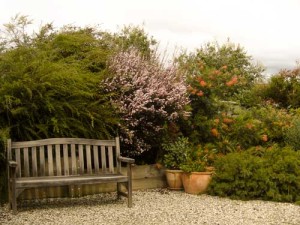By David Thurley, Albury Councillor
 From reading the articles over several years it is clear that the words mean many different things. For some it is about composting and waste minimisation, for others it is about what food they eat and how it is grown. There are those who are avid recyclers and those who minimise their energy consumption. Most of these things come into our style of living lightly but there is more.
From reading the articles over several years it is clear that the words mean many different things. For some it is about composting and waste minimisation, for others it is about what food they eat and how it is grown. There are those who are avid recyclers and those who minimise their energy consumption. Most of these things come into our style of living lightly but there is more.
When we moved into our house on a small (760m2) block in Albury we had lawns and paved areas with few trees and shrubs. The house was well oriented but there was little shade and the sun beat down heating the northern and western walls of our bedroom. We had a lawn mower and it came out regularly. The garden was a desert with few bees and other insects and only sparrows and starlings inhabited the space. In the nearby bush we could hear the kookaburras see the kangaroos. But our house was on a different planet!
So out it all went – the lawns, the agapanthus, the standard roses, the rotary clothes line and its balancing weeping elm! It’s all gone, replaced with native plants and gravel paths, not a blade of grass in sight and no lawn mower, brush cutter or other noisy machine required. There was still room for a small but productive veggie garden and some fruit trees yielding copious amount of lemons, limes, oranges and mandarins. The dwarf trees available today are wonderful.
So 7 years on the major tasks are pruning and the occasional replacement of things that have grown old and tired or that didn’t thrive in the conditions.
And what does this mean for “living lightly”? It means that we don’t have to use lawnmowers and other energy consuming equipment and our house is much cooler in summer as a result of the natural shade. But it means so much more. We have large numbers of bees, both native and exotic pollinating our trees and shrubs, insects such as paper wasps that are predators of many garden pests and it is a haven for birds. I have counted over 30 species of birds in the garden and we have striated pardalotes that return every year and raise their chicks in a hanging basket on the patio right outside the living room door. At this time of the year we awake to the sounds of wattle birds and honey eaters in the Euclaypt caesias in our front garden. Living lightly is a delight.
